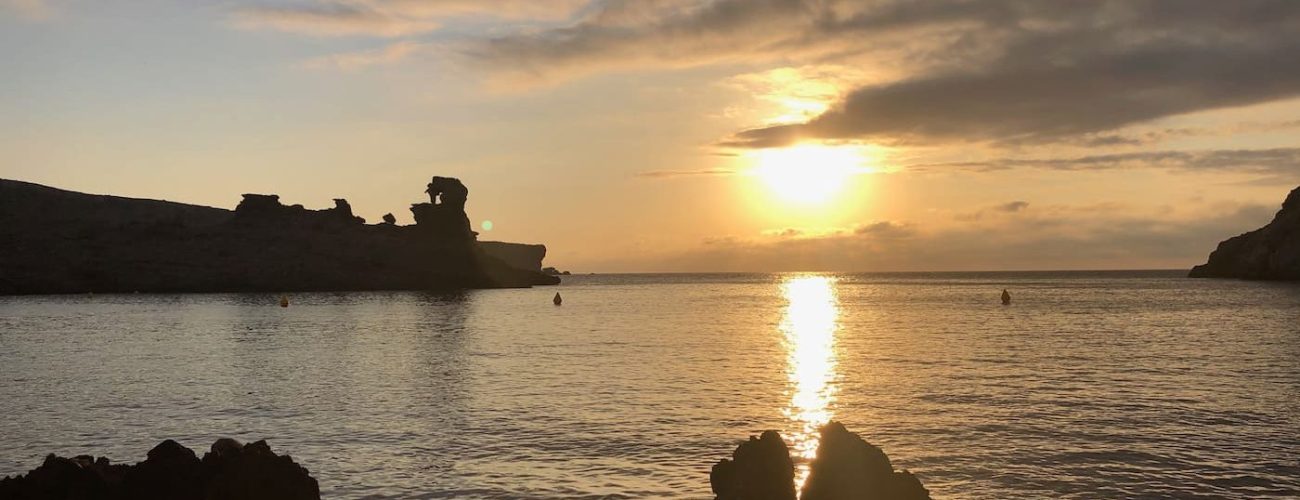
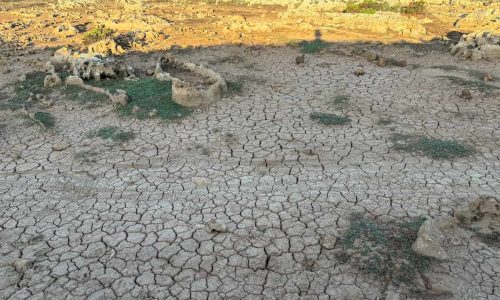
Water
In Cala Morell, which experiences increasingly dry and hot seasons, water stress is a reality. The phenomenal amounts of torrential rain that fell with destructive intensity over just a few days on August 14 and 15, 2024 (DANA), are a symptom of climate distortion and do not make up for the decrease in rainfall throughout the year. There are no illusions that purchasing wells could offset the general scarcity of water. Likewise, it would be dystopian to imagine an urbanization that could monopolize what is a common good to benefit from greater (and abusive) use than others.
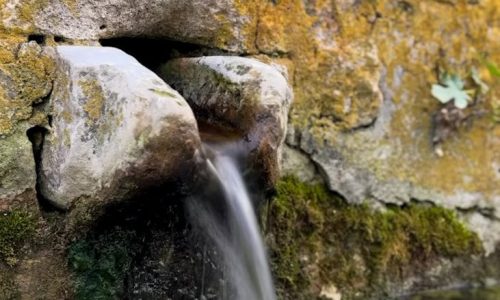
However, what is feasible is that each of us can contribute through our actions to make more responsible use of water.
How to save water in the kitchen and its surroundings
- I use a bowl to wash vegetables instead of doing it with the tap running.
- Then, I reuse this water for watering plants.
- I avoid rinsing the dishes before placing them in the dishwasher.
- I only run the washing machine when I have enough clothes for a full load.
- I buy energy-efficient appliances.
- I don’t throw away the water left in glasses, kettles, or chopping boards: I use it for watering plants!
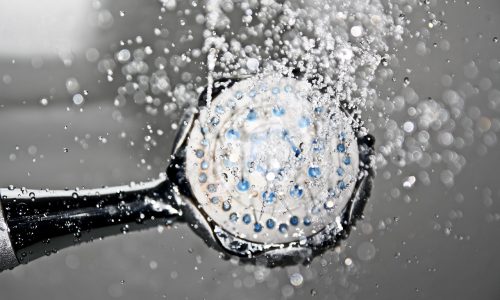
In the bathroom
- Did you know? An open tap can consume between 5 and 8 liters of water per minute.
- I don’t leave the tap running while I brush my teeth, shave, wash my hands, or soap up in the shower.
- I make sure to fix any leaking taps.
- I replace the old toilet flushing system with a more efficient one.
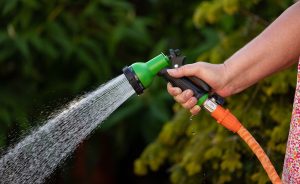
In the garden
- I collect rainwater in a tank or containers and reuse it to water the garden.
- I use a watering can instead of a hose.
- Is it really necessary to have a lawn? Its maintenance requires a lot of water and is not well suited to the dry and saline environment of Cala Morell.
- I think about planting native vegetation that can tolerate the particular conditions of low rainfall, strong winds, and salinity, and won’t require much water.
Let’s remember that water supply is a public service, but its consumption is a private responsibility!
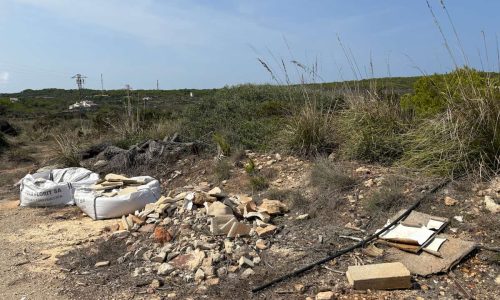
What to do with my debris?
Trash in Cala is becoming a nightmare (video). Sometimes it feels like we live in a favela and not in a privileged urbanization. Much of this depends on us and our sense of civic responsibility. Before blaming others, including public services, let’s do our part to reduce both the amount of waste we produce and where and how we dispose of it.
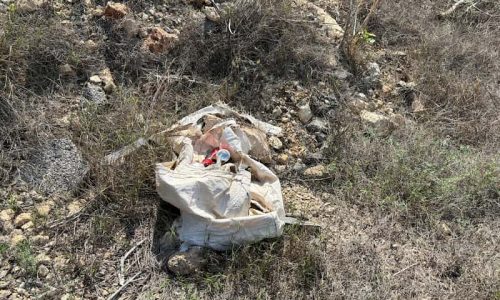
- Are you renovating the house? No longer like those chairs? Do you have old roof tiles and construction debris? Please, don’t leave them next to the containers or on the street. Solution: Take them to the Punto Verde (Green Point) in Ciutadella, located in the industrial area at the following address.
- Bulky debris – those discarded loungers are a sad sight. However, it’s easy to fix: just call 971 48 08 17, and the City Council offers a home collection service!
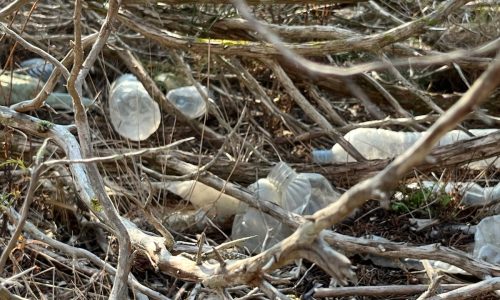
How can I reduce the plastic waste I produce?
There are many actions to reduce plastic use. Any effort, no matter how small, is a contribution to protecting the environment. Every day, we can make a difference with a simple gesture.
Single-use plastic bottles and containers are a disaster for both the terrestrial and marine environment. Scientific and popular literature is filled with alarming statistics about their polluting effects. How can we live without them?
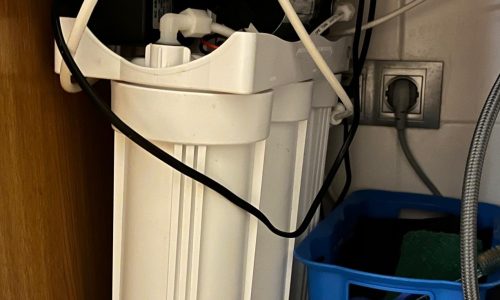
Ideally, installing a water purifier at home would allow us to say goodbye to plastic bottles and jugs, which not only pollute but also fill up the yellow recycling bins. Aside from the benefit to the community and the environment, an initial investment will turn into long-term savings.
Sometimes, reducing our dependence on plastic requires changes in our way of living—like buying more products in bulk—which are not unattainable. Being aware of the problem is the first step. Every individual action toward freeing ourselves from plastic can have a beneficial ripple effect!
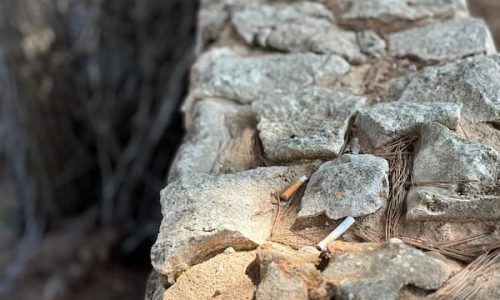
Cigarette butts, no, please!
It’s hard to believe that even today, the roads, fields, beaches, and rocks still serve as ashtrays for some. Aside from being an uncivil habit, each filter contains a mixture of harmful pollutants that damage the environment. In particular, cigarette butts contain cellulose acetate, a form of plastic that is very harmful to the environment. Filters take up to a decade to decompose, and when they do, they release the toxic substances they’ve absorbed from the smoke: nicotine, arsenic, lead…
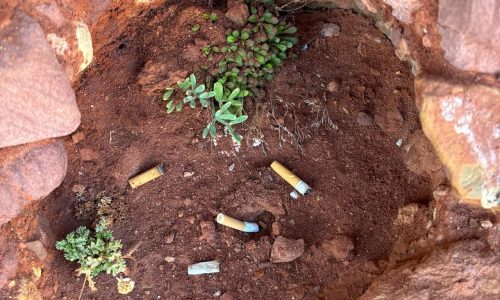
Thrown on the shoreline or into the sea, these cigarette butts end up in the stomachs of fish, which consume them thinking they are food. In fact, they eventually end up in our stomachs too!
Each cigarette butt can pollute between 8 and 10 liters of seawater, so please, let’s think about it before leaving a cigarette butt on the beach or among the rocks!
Not only do they pollute, but every cigarette butt also poses a fire risk. In ditches, roadsides, among bushes, in the scrubland, or in the forest: let’s not believe that firebreaks alone will prevent a fire from starting—drought and heat, combined with our carelessness and bad habits, are an irresistible cocktail for flames.

Water
In Cala Morell, which experiences increasingly dry and hot seasons, water stress is a reality. The phenomenal amounts of torrential rain that fell with destructive intensity over just a few days on August 14 and 15, 2024 (DANA), are a symptom of climate distortion and do not make up for the steady decrease in rainfall throughout the year. Despite the spring rains, water reserves remain below the level recorded a year ago. Let there be no illusions: even purchasing wells could never offset the general scarcity of water. Likewise, it would be dystopian to imagine an urbanization that could monopolize what is a common good so that a few could benefit from greater (and abusive) use of water than others.
What is feasible, however, is that each of us can contribute through our actions to make a more responsible use of water.
How to save water in the kitchen and its surroundings
- I use a bowl to wash vegetables instead of doing it with the tap running.
- Then, I reuse it for watering plants.
- I avoid rinsing the dishes before placing them in the dishwasher.
- I only run the washing machine when I have enough clothes for a full load.
- I buy energy-efficient appliances.
- I don’t throw away the water left in glasses, kettles, or chopping boards: I use it for watering plants!


In the bathroom
- Did you know? An open tap can consume between 5 and 8 liters of water per minute.
- I don’t leave the tap running while I brush my teeth, shave, wash my hands, or soap up in the shower.
- I make sure to fix any leaking taps.
- I replace the old toilet flushing system with a more efficient one.
In the garden
- I collect rainwater in a tank or containers and reuse it to water the garden.
- I use a watering can instead of a hose.
- Is it really necessary to have a lawn? Its maintenance requires a lot of water and is not well suited to the dry and saline environment of Cala Morell.
- I try to plant native vegetation that can tolerate the particular conditions of low rainfall, strong winds, and salinity, and won’t require much water.
Let’s remember that water supply is a public service, but its consumption is a private responsibility!


What to do with my rubbish?
Trash in Cala is becoming a nightmare (video). Sometimes it feels as though we live in a favela and not in a privileged urbanization. Much of this is up to us and our sense of civic responsibility. Before blaming others, including public services, let’s do our bit to reduce both the amount of waste we produce and where and how we dispose of it.
- Are you renovating the house? No longer like those chairs? Do you have old roof tiles and construction debris? Please, don’t leave them next to the containers or on the street. Solution: take them to the Punto Verde (Green Point) in Ciutadella, located in the industrial area at the following address.
- Bulky debris – those discarded loungers are a sad sight. However, it’s easy to fix: just call 971 48 08 17, and the City Council offers a home collection service!
All information and regulations on waste and debris management


How can I reduce the plastic waste I produce?
There are many actions to reduce plastic use. Any effort, no matter how small, is a contribution to protecting the environment. Every day, we can make a difference with a simple gesture.
Single-use plastic bottles and containers are a disaster for both the terrestrial and marine environment. Scientific and popular literature is filled with alarming statistics about their polluting effects. How can we live without them?
Ideally, installing a water purifier at home would allow us to say goodbye to plastic bottles and jugs, which not only pollute but also fill up the yellow recycling bins. Aside from the benefit to the community and the environment, an initial investment will turn into long-term savings.
Sometimes, reducing our dependence on plastic requires changes in our way of living—like buying more products in bulk—which are not unattainable. Being aware of the problem is the first step. Every individual action toward freeing ourselves from plastic can have a beneficial ripple effect!


Cigarette butts, no, please!
It’s hard to believe that even today, the roads, fields, beaches, and rocks still serve as ashtrays for some. Aside from being an uncivil habit, each filter contains a mixture of harmful pollutants that damage the environment. In particular, cigarette butts contain cellulose acetate, a form of plastic that is very harmful to the environment. Filters take up to a decade to decompose, and when they do, they release the toxic substances they’ve absorbed from the smoke: nicotine, arsenic, lead…
Thrown on the shoreline or into the sea, these cigarette butts end up in the stomachs of fish, which consume them thinking they are food. As a result, they eventually end up in our stomachs too!
Each cigarette butt can pollute between 8 and 10 liters of seawater, so please, let’s think about it before leaving a cigarette butt on the beach or among the rocks!
Not only do they pollute, but every cigarette butt also poses a fire risk. In ditches, roadsides, among bushes, in the scrubland, or in the forest: let’s not believe that firebreaks alone will prevent a fire from starting—drought and heat, combined with our carelessness and bad habits, are an irresistible cocktail for flames.

